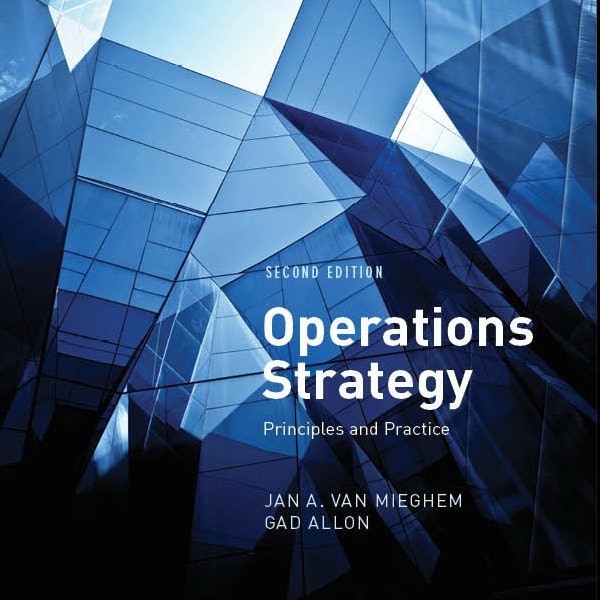Back to Courses









Business Strategy Courses - Page 4
Showing results 31-40 of 543

Fundamentals of Color and Appearance
The Fundamentals of Color and Appearance is an interactive online course, where you will gain a solid foundation in color and appearance science. From the physics of color to lighting, spectrophotometers and color data, you will learn how to measure, view, and communicate color.
This class is designed for all industries and individuals who are quality control and assurance professionals, lab technicians, parts suppliers, manufacturing specifiers, designers and anyone who evaluates or approves color.

Scaling Operations: Linking Strategy and Execution
Over the past several decades, operations strategy has played an increasingly important role in business’ success. In this course, we will equip you with concepts and tools to build operations in a way that not only supports your competitive strategy, but also allows you to create new opportunities in the market place.
Scaling operations: Linking strategy and execution is a five-week course dedicated to making strategic decisions that are grounded in operational reality. Together, we will study how to build and evaluate the “operating system” of the firm to maximize value. This involves tailoring the firm’s operational competencies, assets, and processes to a specific business strategy.
Each week, we’ll explore case studies, engage in discussions and examine realistic data. Thanks to our data-driven approach, you’ll be able to implement your learning directly into practice. At the end of this course, you’ll be ready to build an effective, actionable plan to scale your department or organization.

Hôtel “De l'étoile” - a hotel in crisis?
In this case study based exercise, you will apply the knowledge you have gained about distribution, revenue and demand management to a ‘real’ world case – Hotel “De l'étoile” - a prestigious upmarket internationally branded property in Paris that to the outside world seems to be doing well but is in fact unprofitable for its owner.
Actual data of the distribution performance, revenue management tactics, financial situation will be provided by the hotel partner. In addition detailed information about the hotel’s competitive environment will be provided by several industry partners. Video interviews with senior managers from the property will be used to supplement written material to create a more real world experience.
As the new Director of Business Development hired to help the hotel decide how to proceed, you will evaluate the hotel’s current policies and performance, making recommendations for improvements and and plan how best to implement them.

Fundamentals of Finance
Welcome to Fundamentals of Finance. This 4 module course will help you understand and affect the performance of your unit or organization’s profitability. By the end of this course, you will be able to implement finance and accounting concepts to drive your organization's growth, analyze financial statements and understand the factors in productivity and profitability, and create forecasting and budgeting. You will also have the ability to evaluate and manage cash flow, implement strategies around financing, and use of ratios in running a business.

Annual Campaigns: Building a Case for Support
In this comprehensive overview of annual giving programs, you’ll gain an introduction to the basic terminology and concepts of annual giving as well as the various solicitation channels and donor types. Learn how to write a direct mail appeal, craft an impactful email appeal, and develop a script for phone solicitation. You’ll learn how to build a leadership annual giving portfolio and maximize the impact of memberships and events in annual campaigns. You’ll complete the course with the knowledge and skills to build and implement a multi-channel solicitation strategy that achieves the goals of an annual campaign.

Circular Economy - Sustainable Materials Management
This course looks at where important materials in products we use every day come from and how these materials can be used more efficiently, longer, and in closed loops. This is the aim of the Circular Economy, but it doesn’t happen on its own. It is the result of choices and strategies by suppliers, designers, businesses, policymakers and all of us as consumers.
In addition to providing many cases of managing materials for sustainability, the course also teaches skills and tools for analyzing circular business models and promotes development of your own ideas to become more involved in the transition to a Circular Economy.
You will learn from expert researchers and practitioners from around Europe as they explain core elements and challenges in the transition to a circular economy over the course of 5 modules:
Module 1: Materials. This module explores where materials come from, and builds a rationale for why society needs more circularity.
Module 2: Circular Business Models. In this module circular business models are explored in-depth and a range of ways for business to create economic and social value are discussed.
Module 3: Circular Design, Innovation and Assessment. This module presents topics like functional materials and eco-design as well as methods to assess environmental impacts.
Module 4: Policies and Networks. This module explores the role of governments and networks and how policies and sharing best practices can enable the circular economy.
Module 5: Circular Societies. This module examines new norms, forms of engagement, social systems, and institutions, needed by the circular economy and how we, as individuals, can help society become more circular.
This course is brought to you by:
LUND UNIVERSITY
INTERNATIONAL INSTITUTE FOR INDUSTRIAL ENVIRONMENTAL ECONOMICS (IIIEE)
EIT RAWMATERIALS
VITO
GEOLOGICAL SURVEY OF DENMARK AND GREENLAND
NATIONAL TECHNICAL UNIVERSITY OF ATHENS
GHENT UNIVERSITY
DELFT UNIVERSITY OF TECHNOLOGY

Using Twitter for Business and Twitter Analytics
In this 1-hour long project-based course, you will learn how to
- use twitter for business
- understand twitter analytics
- understand complex twitter usage
Note: This course works best for learners who are based in the North America region. We’re currently working on providing the same experience in other regions.

Leadership Through Marketing
The success of every organization depends on attracting and retaining customers. Although the marketing concepts for doing so are well established, digital technology has empowered customers, while producing massive amounts of data, revolutionizing the processes through which organizations attract and retain customers. In this course, students will learn how to identify new opportunities to create value for empowered consumers, develop strategies that yield an advantage over rivals, and develop the data science skills to lead more effectively, allocate resources, and to confront this very challenging environment with confidence.

How Billing and Payments Work on Pinterest
At the end of this project, you will have learned everything you need to know about billing and payment on Pinterest. You will have learned how to set up billing information and what different payment options Pinterest offers. Additionally, you will learn how to set up a payment schedule.
Advanced Competitive Strategy
Advanced Competitive Strategy will introduce new topics and modules with even more real world examples and opportunities for student interaction than in the previous course Competitive Strategy (https://www.coursera.org/learn/competitivestrategy).
In Advanced Competitive Strategy, we will look at how companies can build up and maintain their customer base by increasing switching costs and facilitating strategic customer lock-ins. We will find out how firms can increase their profits by pursuing suitable price discrimination and product differentiation strategies.
We will look at examples of what is acceptable behavior under the premises of EU competition and US antitrust policies and discover exciting ways of how companies can increase their returns by strategically making use of network effects and economies of size. We will further intensify our newly acquired knowledge about network effects and discuss strategies that are explicitly tailored to network markets.
We will analyze the workings of mergers and acquisitions and, moreover, support you in considering alternative strategies that can help companies grow organically.
Popular Internships and Jobs by Categories
Find Jobs & Internships
Browse
© 2024 BoostGrad | All rights reserved